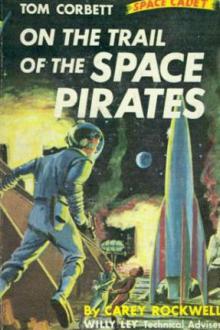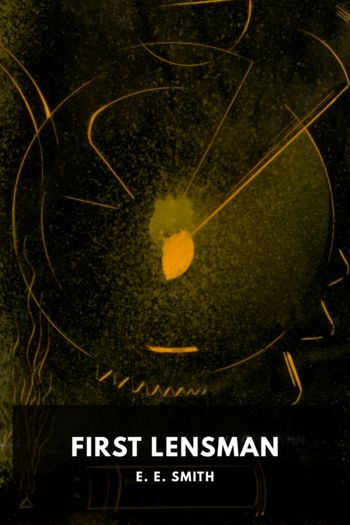Triplanetary - E. E. Smith (phonics reader TXT) 📗

- Author: E. E. Smith
Book online «Triplanetary - E. E. Smith (phonics reader TXT) 📗». Author E. E. Smith
“When the Sliver really cuts loose it means a rough party, all right,” Cleveland assented, snapping about his body the heavy spring-straps of his deeply cushioned seat, “but I’m just as anxious to get back to the Hill as anybody can be to get me there. All set.”
Rodebush waved his hand at the pilot and the purring whisper of the exhausts changed instantly to a deafening, continuous explosion. The men were pressed deeply into their shock-absorbing chairs as the Silver Sliver spun around her longitudinal axis and darted away from the Chicago with such a tremendous acceleration that the spherical warship seemed to be standing still in space. In due time the calculated midpoint was reached, the slim space-plane rolled over again, and, mad acceleration now reversed, rushed on toward the Earth, but with constantly diminishing speed. Finally a measurable atmospheric pressure was encountered, the needle prow dipped downward, and the Silver Sliver shot forward upon her tiny wings and vanes, nose-rockets now drumming in staccato thunder. Her metal grew hot; dull red, bright red, yellow, blinding white; but it neither melted nor burned. The pilot’s calculations had been sound, and though the limiting point of safety of temperature was reached and steadily held, it was not exceeded. As the density of the air increased so decreased the velocity of the man-made meteorite. So it was that a dazzling lance of fire sped high over Seattle, lower over Spokane, and hurled itself eastward, a furiously flaming arrow; slanting downward in a long, screaming dive toward the heart of the Rockies. As the now rapidly cooling greyhound of the skies passed over the western ranges of the Bitter Roots it became apparent that her goal was a vast, flat-topped, conical mountain, shrouded in violet light; a mountain whose height awed even its stupendous neighbors.
While not artificial, the Hill had been altered markedly by the engineers who had built into it the headquarters of the Triplanetary Service. Its mile-wide top was a jointless expanse of gray armor steel; the steep, smooth surface of the truncated cone was a continuation of the same immensely thick sheet of metal. No known vehicle could climb that smooth, hard, forbidding slope of steel; no known projectile could mar that armor; no known craft could even approach the Hill without detection. Could not approach it at all, in fact, for it was constantly enclosed in a vast hemisphere of lambent violet flame through which neither material substance nor destructive ray could pass.
As the Silver Sliver, crawling along at a bare five hundred miles an hour, approached that transparent, brilliantly violet wall of destruction, a light of the same color filled her control room and as suddenly went out; flashing on and off again and again.
“Giving us the once-over, eh?” Cleveland asked. “That’s something new, isn’t it?”
“Yes, it’s a high-powered ultra-wave spy,” Rodebush returned. “The light is simply a warning, which can be carried if desired. It can also carry voice and vision. …”
“Like this,” Samms’ voice interrupted from a speaker upon the pilot’s panel and his clear-cut face appeared upon the television screen. “I don’t suppose Fred thought to mention it, but this is one of his inventions of the last few days. We are just trying it out on you. It doesn’t mean a thing though, as far as the Sliver is concerned. Come ahead!”
A circular opening appeared on the wall of force, an opening which disappeared as soon as the plane had darted through it; and at the same time her landing-cradle rose into the air through a great trap-door. Slowly and gracefully the space-plane settled downward into that cushioned embrace. Then cradle and nestled Sliver sank from view and, turning smoothly upon mighty trunnions, the plug of armor drove solidly back into its place in the metal pavement of the mountain’s lofty summit. The cradle-elevator dropped rapidly, coming to rest many levels down in the heart of the Hill, and Cleveland and Rodebush leaped lightly out of their transport, through her still hot outer walls. A door opened before them and they found themselves in a large room of unshadowed daylight illumination; the office of the Chief of the Triplanetary Service. Calmly efficient executives sat at their desks, concentrating upon problems or at ease, according to the demands of the moment; agents, secretaries, and clerks, men and women, went about their wonted tasks; televisotypes and recorders flashed busily but silently—each person and machine an integral part of the Service which for so many years had been carrying an ever-increasing share of the load of governing the three planets.
“Right of way, Norma?” Rodebush paused before the desk of Virgil Samms’ private secretary. She pressed a button and the door behind her swung wide.
“You two do not need to be announced,” the attractive young woman smiled. “Go right in.”
Samms met them at the door eagerly, shaking hands particularly vigorously with Cleveland.
“Congratulations on that camera, Lyman!” he exclaimed. “You did a wonderful piece of work on that. Help yourselves to smokes and sit down—there are a lot of things we want to talk over. Your pictures carried most of the story, but they would have left us pretty much at sea without Costigan’s reports. But as it was, Fred here and his crew worked out most of the answers from the dope the two of you got; and what few they haven’t got yet they soon will have.”
“Nothing new on Conway?” Cleveland was almost afraid to ask the question.
“No.” A shadow came over Samms’ face. “I’m afraid … but I’m hoping it’s only that those creatures, whatever they are, have taken him so far away he can’t reach us.”
“They certainly are so far away that we can’t reach them,” Rodebush volunteered. “We can’t even get their ultra-wave interference any more.”
“Yes, that’s a hopeful sign,” Samms went on. “I hate to think of Conway Costigan checking out. There, fellows, was





Comments (0)